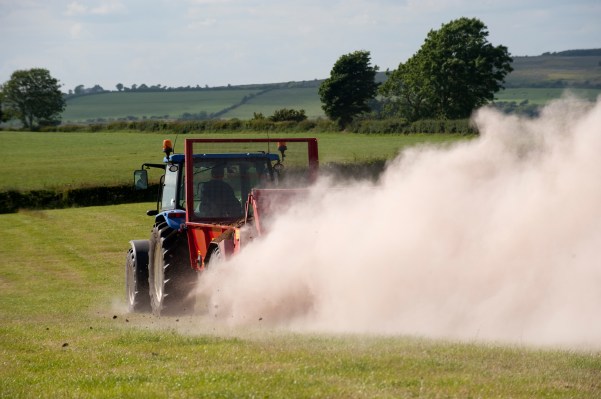Agriculture produces what might be some of the hardest planet-warming carbon emissions to eliminate. People need to eat, and right now, the way we make food generates a lot of greenhouse gases — about a third of the total created by human activity. There are some simple ways to reduce it, like eating less meat, but there’s a point where cutting is no longer an option.
That’s why there’s growing interest in something called enhanced rock weathering, where minerals that naturally absorb carbon dioxide from the atmosphere are crushed up and spread on soils to speed the process. It happens that some of these minerals are also beneficial for farmers and ranchers, many of whom have been searching in vain for ways to reduce their operations’ carbon emissions.
There are a few startups chasing this market, and one promising company, Eion, is announcing a $12 million Series A today, TechCrunch has exclusively learned. The round was led by AgFunder and Ridgeline, with participation from Carbon Removal Partners, Mercator Partners, Orion, Overture, SLVC, Trailhead Capital and mineral supplier Sibelco, which the company has an off-take agreement with.
“We need a hockey-stick growth path to deal with the gigaton challenge that we have in front of us,” Eion founder and CEO Adam Wolf told TechCrunch. Enhanced rock weathering, he added, offers that potential.
Eion is one of the companies that Stripe’s climate program bought carbon credits from last year, and it’s been using that money to kick-start its operations. The new funding will allow the startup to finalize its methodology, expand operations and build a mill to crush rock to help produce its patented soil amendment called CarbonLock.
CarbonLock is essentially pulverized olivine, a naturally occurring mineral that excels at absorbing carbon from the atmosphere. One ton of the stuff applied to a pasture or farm field can absorb one ton of carbon dioxide. It also functions as an agricultural lime, helping to reduce the acidity of the soil to a level that crops prefer. The simple substitute means that many farmers and ranchers are already receptive to the product.
Eion’s soil amendment begins life as solid olivine mined in Norway, where it’s loaded into ships and sent to Mobile, Alabama. There, it’s crushed to increase its surface area, which serves to make it easier to spread on fields and help it absorb carbon dioxide more quickly. Once pulverized, it’s either loaded onto a truck or barge and then onto farm fields and pastures where it’s typically applied once every two years. On average, two tons of CarbonLock are applied for every acre of farmland, though that can vary depending on the specific soil conditions.
One of the challenges enhanced rock weathering has faced is proving that it works. Soils may look simple, but they’re fantastically complex systems of minerals, microorganisms, plants and detritus all swapping various nutrients and compounds. Adding stuff to that system can tip the balance — and not always in the right way.
To ensure that Eion’s soil amendment is working as intended, the company has a way of tracking the fate of the olivine that’s applied. Olivine naturally contains small amounts of rare earth metals in addition to the magnesium iron silicate that makes up the bulk of it. When applied to a field, the mineral reacts with water and carbon dioxide to produce a bicarbonate solution that’s eventually washed away into the ocean, where it also helps combat acidification. By measuring how much magnesium and rare earths remain, the company can validate how much carbon has been sequestered.
Now, despite olivine’s excellent carbon-trapping qualities, it does have a potential downside — heavy metals. Nickel and chromium also occur naturally within olivine rocks, and too much of certain types of either can be toxic. Wolf said that the types and amounts Eion is applying to fields shouldn’t pose a problem for nickel in particular, and the chromium in its product is chromium(III), which is an essential nutrient for humans.
The problem species is chromium(VI), or hexavalent chromium. That’s typically a byproduct of industrial processes like chrome plating or leather tanning, though in some cases it can form naturally as chromium(III) oxidizes. “It’s certainly necessary to pay close attention to it. But as we dug deep into it, it’s really not anything to be concerned about,” Wolf said.
Currently, carbon credit buyers like Stripe are funding the operation, though Wolf said that his company is exploring other revenue sources for the future, including payments from farmers or food brands and potential cost-sharing on the part of the federal government.
“I see this ultimately becoming a utility, like garbage collection, which is like ubiquitous,” Wolf said. “It’s not necessarily a high-margin business, but it is vast in scale.”
To get enhanced rock weathering to work at that scale, Wolf thinks that Eion and its competitors will need broad social buy-in.
“We need to make sure that we’re involving everybody,” he said, adding that’s why his supply chain involves a number of family-owned businesses. “That creates a natural alignment between us and the port and the truckers and the farmers and agronomists. That can grow organically.”
